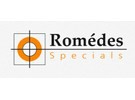When it comes to matters of non-standard automation solutions, several market players have been asking Romédes for help lately, which has already resulted in a unique DNA purifier for a Dutch potato breeder. Ralph Wessels, sales coordinator at this engineering firm which has both an engineering and a special machinery branch, explains why this breeder approached them.

1536 samples per run
"The breeder wanted us to help them scale up their DNA isolation and purifying process and they did not want to be dependent on one type of disposable any longer. There are no 'standard' machines available for that," Ralph begins.
"We build such specialized custom machines for various industries, including medical, agricultural, plastics, and food industries. This machine, the Magnetic Bead Extractor, does 16 times what standard machines in the market do. It has significantly increased the breeder's scale."
This industrialized laboratory machine uses magnets to process and purify up to 1.536 DNA samples (16 times 96-well plates) per run. Although this technique is not a new one, the scale at which this machine implements it is. "I've not seen a similar machine on the market yet," Ralph says.
DNA purification is usually comprised of multiple steps. The user can adjust the process to their liking, making it consist of up to 12 purification or process steps. "To optimize the chemical process, the final purification step, elution, can also be executed while being heated. Furthermore, it is also possible to set the vibration frequencies with which the contaminations are separated from the pure DNA on either low, medium, or high."
Flexibility in disposables
Few companies in the Netherlands use machines like these on this scale. Nevertheless, Romédes sees plenty of opportunities in the (international) horticulture sector. "We are in contact with several breeders and horticulturalists, some of whom are active in floriculture as well."
Ralph notices that businesses are no longer interested in scaling up only; they are also particularly interested in not having to be dependent on one type of disposable (one supplier) in the process any longer.
"The potato breeder's machine can process various types of plates (shallow and deep well) from different brands. Other companies, too, are looking for ways to be more flexible and save production costs. The additional benefit of validation tests is an improved DNA yield with higher buffer solution concentrations. The KASP test performances are improved because of that, too."
Automation partner
The company not only provides special laboratory automation, it is also possible to automate packaging, handling, and other processes. "We build customized machines for that too. We aim to be a partner in solutions and process improvements," Ralph concludes.
For more information:
Ralph Wessels
Romédes Specials B.V.
Tel: +31 (0) 544 356 180
Email: [email protected]
Website: www.romedes.nl
